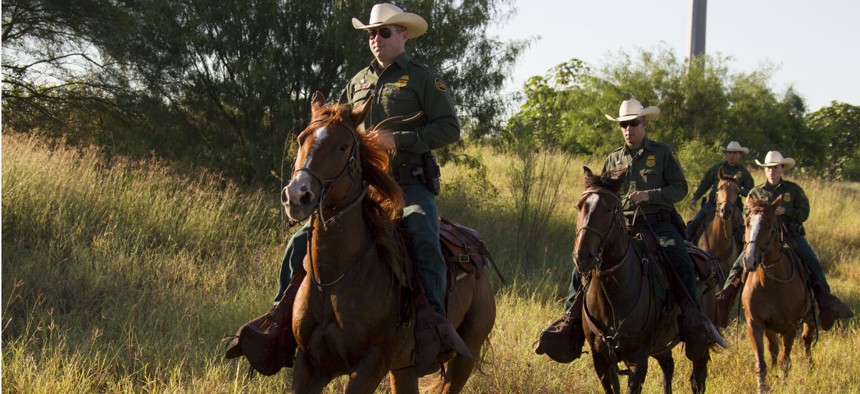
Agents patrol on horseback in South Texas. The IG said wastefulness could hinder CBP's planned Border Patrol hiring spree. Donna Burton / CBP file photo
CBP Administered Polygraphs to Applicants Already Admitting Drug Smuggling, Human Trafficking
The agency wasted $5 million giving exams to candidates it should have already deemed unsuitable, IG says.
Customs and Border Protection is spending millions of dollars conducting lie-detector tests on job applicants who have already admitted disqualifying information during their interviews, according to the Homeland Security Department inspector general. The IG warned the wastefulness could derail President Trump’s planned hiring spree at the agency.
While a 2010 law requires all CBP applicants to take a polygraph exam prior to employment, potential employees first must submit documentation and participate in a pre-test interview. The IG estimated CBP spent $5.1 million on 2,300 polygraphs between fiscal years 2013 and 2016 in which the candidates freely made “disqualifying admissions” -- such as illegal drug use and smuggling, human trafficking or close relationships to people engaged in those crimes -- before the exam took place. That represents about 7 percent of the agency’s $72 million in spending on polygraphs in that timeframe.
Of equal concern to the auditors was the misallocation of “limited polygraph resources” and the added burden to an already backlogged CBP hiring process.
“Given its plans to hire 5,000 additional Border Patrol agents, it is important that CBP focus its resources on the most qualified and suitable applicants,” said John Roth, the DHS inspector general. His office recently questioned the need for the hiring at all, finding CBP and Immigration and Customs Enforcement have failed to demonstrate an operational justification for the dramatic workforce augmentation.
CBP has no process in place to stop an unsuitable candidate from continuing on to the polygraph test, the IG said. The agency attempted to implement a program in which on-call adjudicators could determine if a candidate was unsuitable immediately and prevent the test from occurring, but officials failed to consistently use that resource. Each polygraph costs CBP $2,200 to administer.
The IG said steps CBP has taken this year to ramp up its on-call adjudication program would still not prevent unnecessary exams from taking place, and recommended the agency institute in-person “pre-security interviews well before” the lie detector test. The auditors also said CBP should institute a policy to immediately stop any scheduled polygraph if an adjudicator has already ruled the candidate unsuitable.
Agency management agreed to implement the recommendations, but said the IG may have overestimated the cost of the unnecessary exams. The auditors replied that, if anything, their estimate was on the low end.
Congress instituted the polygraph requirement for CBP’s law enforcement positions through the 2010 Anti-Border Corruption Act after a rapid buildup of Border Patrol personnel during the George W. Bush administration led to widespread misconduct at the agency. CBP is currently piloting an initiative to shorten the polygraph exam in an effort to hasten the burdensome hiring process, though the agency has vowed not to sacrifice the quality of its vetting as it seeks to fulfill Trump’s call for 5,000 new BP agents. It also supports an effort under way in Congress to exempt certain individuals previously serving in law enforcement or the military from the polygraph requirement. The House and a Senate panel have already advanced legislation to that effect.
NEXT STORY: Play of the Day: Guam is Not Worried







